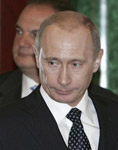 Reuters: Russian Prime Minister Vladimir Putin has told France that Moscow will freeze a delivery of S-300 missiles to Iran after passage of extended U.N. sanctions against Tehran, the French president’s office said Friday.
Reuters: Russian Prime Minister Vladimir Putin has told France that Moscow will freeze a delivery of S-300 missiles to Iran after passage of extended U.N. sanctions against Tehran, the French president’s office said Friday.
By Emmanuel Jarry
 PARIS (Reuters) – Russian Prime Minister Vladimir Putin has told France that Moscow will freeze a delivery of S-300 missiles to Iran after passage of extended U.N. sanctions against Tehran, the French president’s office said Friday.
PARIS (Reuters) – Russian Prime Minister Vladimir Putin has told France that Moscow will freeze a delivery of S-300 missiles to Iran after passage of extended U.N. sanctions against Tehran, the French president’s office said Friday.
Russia had earlier insisted on its right to carry out the air defense contract. Its rethink underlined how the tolerance of non-Western big powers for Iran’s disputed nuclear activity is fading, and could deny Iran formidable protection against any military attacks on its atomic installations.
Western intelligence indicates Iran is 1-3 years away from the capability to produce a nuclear weapon, giving the world some time to rein in its uranium enrichment program with sanctions, U.S. Defense Secretary Robert Gates said.
Parts of Iran’s oil and gas industry could be targeted by an extra layer of European Union sanctions reaching substantially those approved by the U.N. Security Council Wednesday, according to a document prepared for EU leaders.
Hardline Iranian leaders have greeted the Security Council’s action with defiance and contempt, vowing to pursue an escalating enrichment program and review already tense relations with U.N. nuclear inspectors.
But the Kremlin shift on the S-300s, a deal first disclosed by Iran in 2007, pointed to Tehran’s increased diplomatic isolation over its secretive campaign for nuclear capability.
AIR Defense
The S-300 is a mobile, long-range air defense system that can detect, track and destroy ballistic missiles, cruise missiles and low-flying aircraft.
The United States and Israel, Iran’s two arch-foes and rivals for predominance in the Middle East, have long fiercely opposed such a sale because it could give Iran the means to withstand air strikes aimed at knocking out its nuclear sites.
After conflicting signals from Moscow, Putin confirmed Russia would shelve the delivery, President Nicolas Sarkozy’s office said after talks between the two men Friday.
A Sarkozy spokesman quoted the Russian leader as saying Iran was “very unhappy” and wanted to impose penalties on Moscow.
A Kremlin source had told Reuters earlier in the day that “S-300 supplies to Iran fall under U.N. sanctions.”
Security Council diplomats said the resolution’s call for “vigilance and restraint” from U.N. member states on arms sales to Iran meant that Moscow was being strongly discouraged from delivering the sophisticated S-300s.
The sanctions resolution, initiated by the United States and major European allies and co-sponsored by Russia and China, expands existing measures targeting Iranian banks and arms imports, and also calls for setting up a cargo inspection regime similar to one in place for North Korea.
A senior Iranian lawmaker warned Friday that Iran would start inspecting foreign vessels in the Gulf, a waterway crucial for global oil supplies, if its ships received such treatment under the new U.N. sanctions.
Iran says it is refining uranium only to the low level of purity needed for electricity generation or medical isotopes.
But its record of hiding sensitive activity from U.N. inspectors and recent launch of higher-grade enrichment has raised international suspicions of a camouflaged quest to produce material and components for nuclear warheads.
ISRAELI THREAT
Increasingly impatient Israeli officials have mooted military action should sanctions and diplomacy, both ineffectual for years, prove incapable of reining in Iran.
But Israel is unlikely to hit Iran without U.S. support, and both remain publicly committed to sanctions and diplomacy.
Russia has close trade ties with Iran and is building its first nuclear power plant. It has worked with China, another veto-wielding Security Council member, to water down four packages of sanctions adopted against Tehran since 2006.
However, it has become exasperated with Iran’s restrictions on U.N. nuclear inspections and its refusal to accept Russian-backed proposals to help dispel suspicions about its nuclear program.
Gates, asked by reporters after a NATO meeting in Brussels how long the United States and its allies were prepared to wait for U.N. sanctions on Iran to bite, said:
“Most people believe that the Iranians could not really have any nuclear weapons for at least another year or two. I would say the intelligence estimates range from one to three years.”
Even if Iran got that far, it would still have to produce a nuclear missile delivery system capable of menacing neighbors or enemies further afield. “But clearly them getting to the threshold of having the weapons is what concerns everybody.”
The EU measures would not restrict Iranian oil and gas exports or imports but would seek to shut off new investment in the industry, as well as transfer of technology, equipment and services to a sector that is economically vital to Iran.
Iran is the world’s fifth largest crude oil exporter.
The EU restrictions are contained in a draft prepared for a June 17 summit.
(Additional reporting by Denis Dyomkin in Tashkent, Adam Entous, David Brunnstrom and Luke Baker in Brussels, Hashem Kalantari in Tehran; Writing by Mark Heinrich; Editing by Kevin Liffey)


